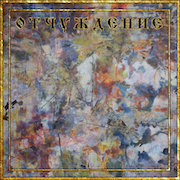Umberto’s Matt Hill’s early releases were characterised by sounds and imagery clearly indebted to the golden age of Italian horror and giallo cinema, when, over a few mad, glorious and terrifying years, the Mediterranean country stood as a beacon of cinema at its most extreme. Hill’s 2010 album Prophecy of the Black Widow came in a cover adorned in garish horror lettering and leering neon skulls, whilst his synth-heavy music was smeared in the kind of moody horror stylings that dominate the soundtracks of great Italian horror films like Suspiria and The Beyond. References to Goblin were common in reviews of the album. However, by 2013’s Confrontations, Umberto started a stylistic shift that he pursues on Alienation, one which sees him maintain the gloomy atmosphere of Prophecy of the Black Widow but take his music forwards in an odd direction: the dancefloor.
Confrontations had as its core theme alien encounters, but abounded with catchy beats and shuffling synth pads, a nod therefore not just to horror soundtracks but also to italo disco. Alienation is more of a synthesis of the two, and dominated by the mood evoked by the album’s title, with the eponymous opener setting the mood with a John Carpenter-style synth melody and a ghostly, subterranean vocal choir. As one of the other greats of horror soundtracks (indeed, horror cinema in general), Carpenter is an interesting reference point, because his scores often involved a suggestion of hidden terror in comparison with Goblin’s prog-nightmare epics. Umberto ups the fear factor more significantly on ‘Drifters’, the highlight of the album, which features insistent disco beats and wobbly house bass under a blanket of retro-futuristic electronics, gales of monk-like chanting and gristly synths. Hill here explores similar territory to the UK’s Pye Corner Audio, another hauntological explorer of past sonic Hades who has turned his gaze to the dancefloor, and ‘Drifters’ is the closest track on Alienation to the landscape Umberto traveled on Confrontations.
However, where that album had an almost narrative theme, Alienation is much more introspective and, as its title suggests, detached. ‘Drifters’ is the blackened howl of an exception to a mood that is troubled and unfriendly, in ways that will challenge many fans of Umberto’s previous works, but is in many ways, more rewarding. ‘Elimination’ follows ‘Drifters’ death disco with a tinkling, melancholic melody that would be more suited to a seventies UK TV show about creatures at the bottom of the garden than a full-on giallo gorefest, even at times evincing a sense of hope in a faded storyline that inevitably falls back into darkness.
Voices play a key part on Alienation, but they are not conversational, but more the horrific chants of a dark ritual, as heard echoing across a dark field at midnight. On ‘Black Sea’, one emerges, priest-like, from an eddying current of dark electronica that threatens to morph into another danceable track but instead builds into a bleak mantra. ‘White Night’ is initially more muted, with quiet oscillations and the mournful wailing of a female singer reverberating in an empty space, and again the mood is of sadness or forlorn hope, before it evolves into a hook-laden slice of bizarre synth-pop-cum-ambient-dub. Alienation is not cinematic in the way its predecessors were; instead Matt Hill explores deeper, less overt themes, all of which circle the notion of being detached from others. The voices, whether exhorting or lamenting, seem lost in time and in the cold sonic environments the artist is constructing around them. Even when Hill returns to Carpenter, on the somewhat eighties’ horror soundtrack-sounding ‘Dawn of Mirrors’, there is an isolation lurking amidst the sequencer splashes, pumping beats and synth swirls.
And yet, for all Hill’s retreating from the light, there is real compositional variety and intrigue in his songs. The influences are less blatant than before, more intertwined and the music is more elaborate and unpredictable, a feat for any bedroom composer. Some may find the final third of the album, with its more ambient textures and unrelenting sense of loss and only occasional rays of sunshine, a dark and foreboding place to be, but in truth it is merely honest and emotional. As the final track, ‘Passage’ builds into a crescendo fit for any final credit roll, it’s hard not to be impressed with Umberto’s evolution of late, as lacerating experience as it may be at times.


